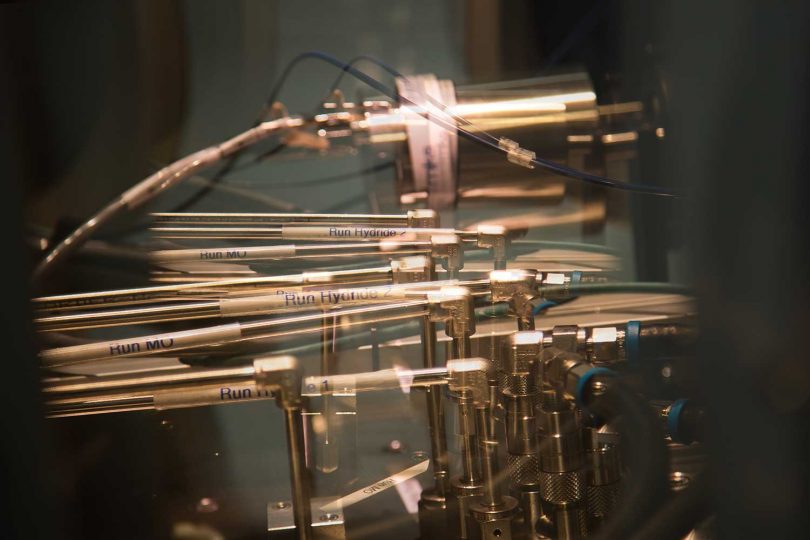TU Braunschweig submits renewal applications for two Clusters of Excellence Continuation of funding to secure innovative research in sustainable aviation and (quantum) metrology for another seven years
Since 2019, the two research projects ‘SE²A – Sustainable and Energy Efficient Aviation‘ and ‘QuantumFrontiers‘ at TU Braunschweig have been funded as part of the Excellence Strategy of the German federal and state governments. In a decisive step, the Cluster of Excellence ‘SE²A’ led by TU Braunschweig and the joint Cluster of Excellence ‘QuantumFrontiers’ of TU Braunschweig and Leibniz Universität Hannover submitted follow-up applications on 22 August 2024 to secure the continuation of funding for another seven years.
“With two successful applications in the first funding phase, TU Braunschweig has established itself as a leading research centre in the fields of sustainable aviation, nanotechnology and quantum physics since 2019. Continued excellence funding will give our researchers the opportunity to pursue their innovative research questions and further develop their impressive scientific ecosystems,” explains TU President Angela Ittel. “I am convinced that the excellent collaboration between our scientists and our non-university research partners, Leibniz Universität Hannover and international partners will make a lasting impression on the reviewers.”
Over the past five months, two teams have been working intensively to prepare the follow-up proposals for the German Research Foundation (DFG).
Prof. Peter Hecker, Vice-President for Research at TU Braunschweig: “I would like to thank everyone involved in the Clusters of Excellence for their tireless efforts. Particularly in the last few months, the teams have gone to extraordinary lengths to summarise the successes of the clusters to date and to present their new research goals in the best possible way for a further funding phase. Research at TU Braunschweig in the fields of sustainable aviation and quantum research not only produces excellent scientific results, but also addresses socially relevant goals. New approaches to environmentally friendly aviation are essential to ensure global mobility in the future. Quantum technology will be a key to the future viability of entire sectors of the economy. We want to continue to provide the best possible support for research in these areas.”
SE²A – Sustainable and Energy Efficient Aviation
The Cluster of Excellence ‘Sustainable and Energy Efficient Aviation Systems SE²A ‘ has been working since 2019 to create the scientific and technological basis for sustainable aviation. The cluster brings together around 140 scientists from the fields of aviation research, electrical engineering, energy research and design. Their goals are to drastically reduce energy consumption and emissions from aircraft, reduce noise pollution, develop tailor-made air traffic management and conduct a holistic assessment of resource consumption and climate impact.
TU Braunschweig is working closely with aviation experts from Germany and the Netherlands. Partners include Leibniz Universität Hannover (LUH), the German Aerospace Centre (DLR), Braunschweig University of Art (HBK), the Physikalisch-Technische Bundesanstalt (PTB) and Delft University of Technology (TU Delft).
“As the only Cluster of Excellence dedicated entirely to aviation, we have made significant progress in researching sustainable and energy-efficient aviation,” says Prof. Jens Friedrichs, spokesperson for the SE²A Cluster of Excellence. “In the last four years, our scientists have published more than 270 papers and significantly expanded our international partnerships. This has led to innovative solutions in energy storage and conversion, new concepts for ultra-efficient flight, but also to pushing the boundaries of what is feasible in a cleaner way. Further funding over seven years would allow us to focus even more on solutions for low-emission and sustainable aviation in the extremely important area of long-haul flights. We will certainly continue to work on this socially important issue.”
QuantumFrontiers
Launched in 2019, the ‘QuantumFrontiers’ cluster aims to perform measurements at the quantum frontier with unprecedented precision. The aim is to expand the horizons of knowledge in fundamental physics and geodesy and to open up new applications. The cluster also promotes interdisciplinary dialogue between physics, engineering, computer science, social sciences and education, and takes into account the social and educational aspects of quantum technology. TU Braunschweig, Leibniz Universität Hannover and the Physikalisch-Technische Bundesanstalt (PTB) Braunschweig combine their expertise in quantum technologies in the Cluster of Excellence QuantumFrontiers. Other partners include the Centre for Applied Space Technology and Microgravity (ZARM), the Laser-Zentrum Hannover e.V. (LZH), the Max Planck Institute for Gravitational Physics (Albert Einstein Institute, AEI) and the DLR Institute for Satellite Geodesy and Inertial Measurement (DLR-SI).
“QuantumFrontiers has taken on leading roles in international collaborations, achieved groundbreaking results and developed an outstanding infrastructure,” says Prof. Andreas Waag, TU spokesperson for the QuantumFrontiers Cluster of Excellence. “We have firmly established the Hanover-Braunschweig region as a dynamic and global centre for quantum technology. In the next funding phase, we will further exploit the control of individual quanta for applications such as more powerful quantum computers or more precise quantum sensors.”
About the Excellence Initiative
In the second decision round of the Excellence Initiative, the 57 currently funded clusters will compete with 41 newly selected research projects that were approved in February. The applications for new and continued funding will be evaluated in detail by international panels between October 2024 and February 2025. Following this evaluation, the Excellence Commission will announce which projects will receive funding on 22 May 2025. Up to 70 selected Clusters of Excellence will be funded for a period of seven years from 1 January 2026. The Commission is made up of members of an international panel of experts and the federal and state ministers of science and research appointed by the Joint Science Conference of the Federal Government and the Länder (GWK).


